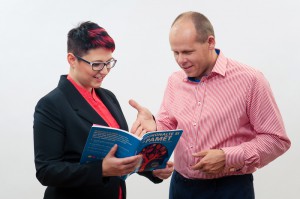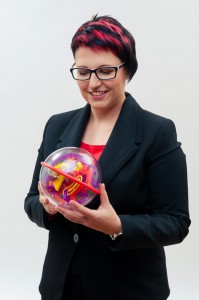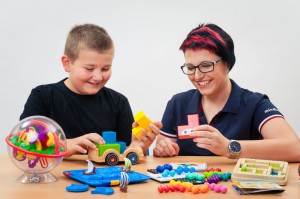Are we able of multitasking? Why are we blind to some important things in our lives? And, can we put too much in our brains?

„Our brain is capable of focusing on one thing only. If we try to manage e-mails while talking to a colleague and making a list of Christmas gifts at the same moment we will make a mistake at something for sure. Accept the fact neither a superwoman or a superman has the ability to do multitasking,“ states a brain trainer Eva Fruhwirtová. On the trainings she proves herself right especially with a device called Mindball. Thank to its brain waves printing we can see in a real time how we handle or not handle to focus during various activities.
In case you work on two things at the same time you don’t save time. On the contrary, the time of a performance will get longer and moreover, the risk of errors will get higher. Each activity we do demands a different process of our brain.

„It’s more useful to work on the tasks step by step. The brain will get ready for thinking about Christmas gifts for example, and if we disturb it with paying bills in internet banking, answering SMS, or solving an arithmetical exercise we force it to adjust all the time which takes considerable amount of energy. We feel exhausted afterwards and furthermore, our list of Christmas gifts is not finished and the arithmetical exercise is not correct,“ describes Eva Fruhwirtová.
According to her, it’s like when you dress yourself in a winter coat and come to a warm room. There you have take the coat off because you are hot. In 5 minutes you would go back to the freezing weather outside so you have to find a cap, pair of gloves, a jacket. You stay out there for 3 minutes, then get back inside and you have to take your clothes off again. Phew. Pretty strenuous, don’t you think?
Do less to get more

Too much information causes a cognitive overload of a brain. A few years ago there were still 2 226 billboards by Czech roads and highways. Information are being thrown at us from internet, TV, radio, press, from colleagues, newsletters, e-mails, notice boards, in public transport. A brain has a limited capacity and there is a filter which protects us from an overload. We don’t have to remember everything. It’s important to distinguish the relevant information.
„We have to be careful what we sign for, what we commit ourselves to on internet, which station we want to get off in an unknown town. In those moments when we can’t decide what’s important for us a self-confusion and stress comes up. That’s why the rule ‘Do less and you’ll get more’ holds good.“ – That’s what Eva recommends.
Help your brain by playing
So, how to calm a brain down to prevent it from the cognitive overload? Eva Fruwhirtová suggests to work in blocs, to not skip from one thing to another, and learn to choose important information. She says your brain can benefit from a game, too. „Our brain likes to play. We work with brain toys which take a person away from worries of life. It’s entertaining and beneficial.“
If you want to try these games come to our January MeetUp in Brno. Eva will be there to show you how to play with your minds 😉
